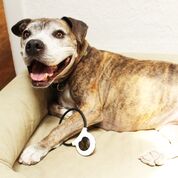For a dog to shake his head on occasion is quite normal – maybe he gets a tickle in his ear, a drop of water on his head, or he is playing with another dog and they both shake off to “re-set” their game. However, if you believe your dog is shaking his head more than normal, it could be a sign of a health issue you want to get checked out by your vet.
A common reason for head-shaking is an ear infection. Floppy-eared dogs, in particular, are susceptible to ear infections, and they can be easy to spot. Usually, the infected ear is particularly dirty with brown or tan goop, and sometimes the ear can even smell like yeast if it is a yeast-based infection. Sometimes, dogs also try to scratch the ear to relieve the pain, and the skin around and behind the ear can become scraped and may even bleed. Ear mites can cause many of the same symptoms, so visit your vet to get a proper diagnosis and antibiotics, if necessary.
 Another cause of head-shaking could also be a result of head-shaking, so it’s kind of a catch-22. Aural hematomas are pockets of blood that build up between the cartilage of the ear and the skin around it and can cause a painful, pressurized pillow of liquid on the dog’s ear. These can be caused by trauma to the ear or stress, or they could just pop up randomly. Unfortunately, while a hematoma can cause a dog to shake its head, it is also exacerbated by the head-shaking, so your dog’s attempt to make it feel better will actually make it worse. Hematomas sometimes go away on their own or can be drained by your vet, but it is best to surgically remove them and for the vet to suture your dog’s skin back to the cartilage where it belongs so the hematoma is less likely to reoccur.
Another cause of head-shaking could also be a result of head-shaking, so it’s kind of a catch-22. Aural hematomas are pockets of blood that build up between the cartilage of the ear and the skin around it and can cause a painful, pressurized pillow of liquid on the dog’s ear. These can be caused by trauma to the ear or stress, or they could just pop up randomly. Unfortunately, while a hematoma can cause a dog to shake its head, it is also exacerbated by the head-shaking, so your dog’s attempt to make it feel better will actually make it worse. Hematomas sometimes go away on their own or can be drained by your vet, but it is best to surgically remove them and for the vet to suture your dog’s skin back to the cartilage where it belongs so the hematoma is less likely to reoccur.
Beyond ears, if a dog has an injury on either side of its head or neck, it can shake its head to try and alleviate the pain or swelling. Check your dog’s jowls, cheeks, and neck for signs of swelling or cuts.
On the more serious end, neurological issues such as concussion, vestibular disease, degenerative myelopathy (aka Wobbler’s Disease), White Shaker Dog Syndrome, or brain lesions can cause strange neck and head movement. If your dog has trouble with balance, is running into door jambs, has trouble when trying to stand, or exhibits some other balance-centered issue, get to the vet. This may require a neurological exam or an MRI, but it’s worth investigatingthe potential seriousness of the condition. The Assisi Loop has been used to treat some of these conditions – most notably, Wobbler’s Disease in a Great Dane.
Finally, sometimes – like humans – dogs just have little personality tics that cause repetitive physical behaviors. Sometimes when dogs get excited or see someone they really like, they may shake their head or the whole body to express that excitement. This generally isn’t a problem, unless the dog has particularly floppy ears – the ends of the ears can sometimes smack into the head too hard and cause splits and cuts! But this is rare and easy to notice if it happens, so don’t worry too much unless your dog is a serious head-shaker.
As always, if you are concerned about your dog, always talk to your vet.

